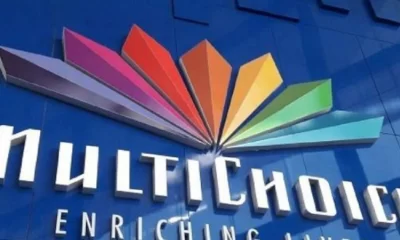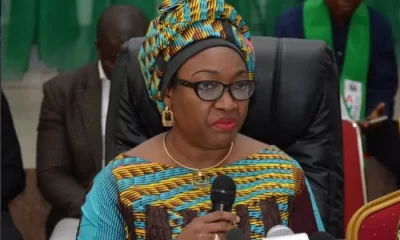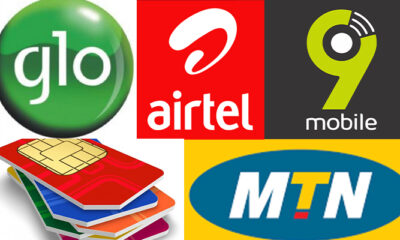Business and Brands
Interswitch: The Story Of One Of Africa’s Earliest Unicorn Company
One can hardly switch from the years of carrying large volumes of cash around to the years of using a card for financial transactions in Nigeria, without mentioning Interswitch.
Like the name suggests, the company uses a ‘switching’ infrastructure to connect the different banks in Nigeria and provides the technology now used for ATM cards. From a time when the company had only 3 banks on its network, Interswitch has grown in the last 19 years and now has 11,000 ATMs across different banks on its network.
How the journey started
A young graduate working in Telnet, Mitchell Elegbe was worried by the several inconveniences Nigerians had to go through to carry out financial transactions. From making long and stressful journeys to the banks, waiting in long queues, missing transaction deadlines, and increased loss of cash to criminals, that was certainly not the easiest of times to be an adult. Some opted for bank drafts to avoid carrying cash to travel, and I remember accompanying my mother to the bank a couple of time to buy a bank draft to pay my school fees.
Many people had to join long queues at the banks on Friday evening to withdraw enough cash for the weekend, and this naturally meant that weekends became work hours for criminals. The most frustrating part of it was that the bank branches did not have any software connecting them, so customers had to continue withdrawing money from the exact branch they opened the account, even when they needed to make long business trips. Even the highway became a playfield for robbers.
The young Elegbe who had only worked two years after his National Youth Service Corps, came up with the Switch idea, but the plans did not materialise as many traditional players were not interested in buying the switch software.
Not deterred by this little glitch, Elegbe went ahead to establish Interswitch, an organisation which would use the Switch software to address the problem. This time, he got the support of Accenture, and also got buy-in from some banks to raise a part of the start-up capital. Getting a Chief Executive to head the company was the next hurdle to be crossed, as Elegbe recalls that most of the capable hands then available were expatriates “who expected to earn more than the company’s capital”.
In search of cheap labour, he had to take up the task even though he had very little experience thus resigning his job at Telnet. The shareholders and the sponsoring company (TELNET) had their concerns at first, but they gave Insterswitch a shot and under Elegbe’s leadership, the company pushed through the uncertain years to become what it is now. Eight years later after starting Interswitch, the company was valued to be worth N26 billion (over $170 million), giving massive returns to early private equity holders. The company’s network grew steadily from 7 banks to 13, and then an ATM consortium and Globacom, a mobile telecommunications provider, up till this point when it has almost all Nigerian banks and 11,000 ATMs on its network.
Though Elegbe had no shares at the outset, his impressive performance earned him and his team some equity in the company in the coming years.
Sigma Pensions
“So you have somebody who invested N10 million in this business going away with N2.6 billion after eight years. That to me was real value,” Elegbe said. When you help solve big problems, Mitchell says, you’re bound to be well rewarded.
Mitchell Elegbe is now the Group MD & CEO, Akeem Lawal is Divisional CEO, Switching & Processing Group while Mike Ogbalu is CEO, Verve International.
In 2019, Visa bought a fifth of Interswitch at a valuation of $1billion, making Interswtich Africa’s first fintech unicorn.
Interswitch is the owner of Verve, an international debit card and Nigeria’s most used payment card which is said to account for over 70% of the 25 million cards in circulation in the country. The company also owns Quickteller, an online payments platform; Retailpay, a mobile business management platform; Interswitch S&P, the first Nigerian in-country interbank transaction switching and third party processing for all card brands; and Smartgov, an identity management and e-payment infrastructure for state governments. Interswitch now serves almost all the state government of Nigeria, and is present in several other African countries including Kenya and Uganda.
Just last month, the group announced the launch of Quickteller Business – a new comprehensive corporate solution focused on empowering businesses of all sizes, to facilitate payments and manage transactions from anywhere in the world– through one, simple integrated platform. The platform added to its launch offer, a three-month zero transaction fee incentive for SMEs that sign up immediately.
Buy-ins, acquisitions and buy-outs
Interswitch has had several achievements over the years, and some more distinct than others. Two-third of the company was sold to a consortium led by Helios Investment Partners in 2010, and barely a year after, Interswitch took a 60% stake in Bankom in Uganda.
In 2013 the payment processing company entered into an agreement with Discover Financial Services, and in September 2014, Interswitch acquired a majority shareholding in Paynet Group, an East-African payments provider.
In 2015 Interswitch launched a $10m investment fund for African start-ups in the payments sector, and has since then, strategically invested in other African startups in the payments services.
Interswitch has also acquired VANSO, a mobile-focused technology provider to banks. This new acquisition has VANSO’s mobile banking, SMS and security business lines being fully integrated into Interswitch’s digital commerce and technology operations in Nigeria, and across Africa.
The IPO that never was
It was in 2016 the Interswitch first hinted at an Initial Public Offering (IPO) on the London Stock Exchange and /or the Nigerian Stock Exchange as part of options to create possible exits for its backers, but that listing never happened due to “unfavourable economic situation”.
By July 2019, it was reported that Interswitch had resumed its IPO plans and enlisted JPMorgan Chase & Co and Standard Bank Group to work on the potential IPO that was expected to value the company between $1.3 billion to $1.5 billion. This listing was expected to come through by 2020, but it is believed that the COVID-19 pandemic and other economic issues which plagued 2020 may have altered the company’s plans.
Coronation ads
A recent statement from the CEO says that Interswitch will continue with alliances in line with its growth plans, but an IPO might not be in immediate view. According to him an IPO may be considered when private equity investors want an exit out of the business.
In place of the earlier expected IPO, the company announced the listing of N23 million bond on the Nigerian Stock Exchange (NSE) in February 2020. The bond is to run at a fixed interest rate of 15% for a tenure of 7 years.
Culled from Naiarametrics.


 Top Stories13 hours ago
Top Stories13 hours agoMohbad’s toxicology result ready…what you need to know

 News13 hours ago
News13 hours agoFG to review fresh price hike of DStv, GOtv packages

 Top Stories13 hours ago
Top Stories13 hours agoWitness Reveals How Ex-HoS, Oyo-Ita, Others Diverted ₦3 Billion To Private Companies

 News13 hours ago
News13 hours agoBlack Market Dollar (USD) To Naira (NGN) Exchange Rate Today 26th April 2024

 Entertainment13 hours ago
Entertainment13 hours agoIsraeli supermodel, Bar Refaeli accuses Bella Hadid of spreading fake news with photo of ‘starving Gaza child’

 Sports12 hours ago
Sports12 hours agoOsimhen reveals how he was pushed to become like Drogba

 News13 hours ago
News13 hours agoTop Nigerian Newspaper Headlines For Today, Friday, 26th April, 2024

 Business and Brands13 hours ago
Business and Brands13 hours agoGlo, MTN, Airtel, Others Move To Raise Tariff






